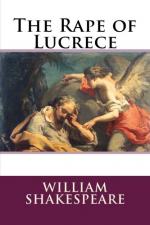|
This section contains 9,651 words (approx. 33 pages at 300 words per page) |

|
SOURCE: Belsey, Catherine. “Tarquin Dispossessed: Expropriation and Consent in The Rape of Lucrece.” Shakespeare Quarterly 52, no. 3 (2001): 315-35.
In the essay below, Belsey studies the treatment of the issues of marriage and rape in The Rape of Lucrece, and demonstrates the ways in which the poem's treatment of these subjects reflects Renaissance thinking.
I
Lucrece tells a story about possession.1 The woman at the center of the story is treated as the proper possession of her husband—or perhaps her father: propriety evidently defines women as property in Shakespeare's Rome. But possessions can be expropriated and property-owners may be dispossessed. Tarquin, driven to lawless violence by an irresistible desire, takes improper possession of the wife of his comrade-in-arms. Thus possessed, however, in the sense that he is impelled to act against his own judgment, Tarquin loses his self-possession and, in the process, his identity as friend, kinsman, prince, Roman...
|
This section contains 9,651 words (approx. 33 pages at 300 words per page) |

|


